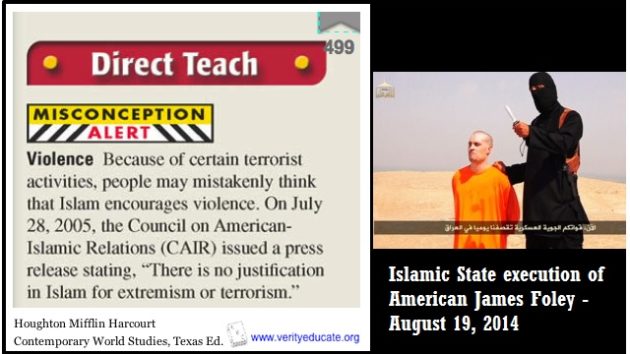CAIR: A Shocking Textbook Expert on Peace and Religion
Why is the above image wrong? Let us count the ways.
1. The quote does not come from the Council on American Islamic Relation (CAIR). It does not even come from a press release. It comes from a fatwa issued by the Fiqh Council of North America at a press conference convened by CAIR. The press release, dated a day earlier, did not contain any such line.
2. CAIR is not a religious authority. It is an activist and advocacy group. In fact, in that press release, CAIR described itself as, “America’s largest Muslim civil rights group.” Educational material should not use advocacy groups as authorities, let alone as experts on religious interpretation. Perhaps the textbook should have quoted a Muslim religious scholar or just explained that the Fiqh Council of North America issued a fatwa on this issue. Maybe the authors thought that using the correct terminology would be scary or confusing. But that would be kind of bigoted, wouldn’t it?
3. Neither the quote provided in the text nor the full fatwa actually validate the textbook’s claim that “people may mistakenly think that Islam encourages violence.” This fatwa does call on Muslims to refrain from violence against civilians, including terrorism. But it does not state anything about the religion encouraging or not encouraging other forms of violence, such as against militaries.
And finally…
4. No one should listen to CAIR on the issue of peace. The organization simply is not credible. If you are wondering what we mean about this, just look up the following phrases together: CAIR, unindicted co-conspirator, joint venturer, U.S. vs. Holy Land Foundation.
If you care about accuracy in textbooks, contact Verity Educate to find out what you can do.


